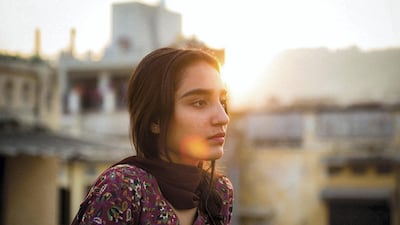Norwegian actor-filmmaker Iram Haq tells a personal story about honour and family with drama What Will People Say, that screened at the Toronto International Film Festival's marquee Platform slate last week.
Like the protagonist in her film, struggles between living a typical teen's life in Norway and pressures from her traditional family culminated in Haq being taken to Pakistan against her will for a year at the age of 14.
"It took a lot of years to develop and to be ready to tell the story," says Haq during a press day in Toronto, where the world premiere of her film has garnered solid reviews from international media.
"I very often find inspiration from myself, and I like to talk about feelings of shame and about what it does to us – loneliness, identity, belonging, love and not feeling loved and feeling rejected," she explains. "All these emotions are so important for me."
Along with praise for Haq's work as a writer and director, newcomer Maria Mozhdah is being singled out for her natural portrayal of 16-year-old Nisha. Her conflict over wanting to fit in and devotion to her parents leads to her doting father (Adil Hussain) kidnapping her to silence wagging tongues. Nisha's sense of betrayal is devastating and her time in Pakistan has shattering consequences.
Haq, 41, says the film is a fictionalised account of her year in Karachi. It left deep scars, and it wasn't until a year before her 82-year-old father's death that the two made peace when he apologised. "Nothing needs to stand still," Haq observed. "Things can change."
The director saw little of her father after she became an adult, but wanted to tell him about the film. "I said it's important to me that you support me in this and he said: 'It's important that you tell this story. You have to do this.'"
Time also allowed Haq to write the script in a balanced, wiser way, "not just like an angry teenager, but to have an understanding of what the parents are going through."
She's a mother of a 21-year-old son and becoming a parent brought another perspective. Talking about issues around honour and shame are important, Haq points out.
"It's happening in so many places in the world," she says. "We cannot lose any more girls. We cannot have more social control. We need a change."
As a Norwegian-born child of immigrants, having a foot in both worlds gave her unique insight as a filmmaker. It allowed her to tell a nuanced story. "I used the knowledge I have to tell a story so we can build bridges and open up a dialogue, because I don't believe in making good guy-bad guy and we're done. That creates a bigger gap."
Haq would like families to see the film together so that both teens and parents can have a better understanding of what each are going through. Indian stage, television and film actor Adil Hussain (Life of Pi and English Vinglish) plays Nisha's father, and Haq doesn't demonise the character. Rather, she explores his struggle, too. "He suits the character so well," she says of Hussain's performance. "He's the right father for this film. He's really great."
Haq has been at Tiff previously with another film that examined a woman caught between cultures, with the feature I Am Yours in 2013. It went on to become Norway's Foreign Film Academy Award submission. "I hope this film can open up the dialogue and be an eye-opener for something new that people start to think about a little bit, and also for the Western world to see that maybe the girl who is sitting next to you in the class is carrying a much heavier burden than looking good or having good grades or friends," she says. "It's so much more."
The Platform program features 12 films from eight countries with a CAD$25,000 (Dh75,307) Platform Prize for the jury-selected best film


